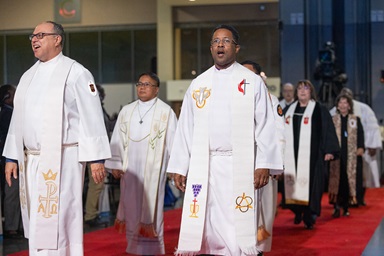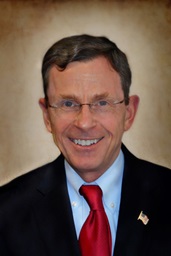Key points:
- As they rebuild their denomination, United Methodists also are grappling with the rise of political strife and “systemic inhumanity.”
- In her address to her fellow bishops, Council of Bishops President Tracy S. Malone urged United Methodists to address both challenges without retreating into nostalgia or fear.
- The bishops also heard a brief update from Bishop Kennetha Bigham-Tsai on a resource to help United Methodists address the rise of authoritarianism. The goal is for a September release.
United Methodists must work to repair the pain caused by the erosion of human rights while also rebuilding the denomination after years of painful church exits.
That was Council of Bishops President Tracy S. Malone’s message to about 100 of her fellow bishops from four continents as they began their spring meeting.
“Black and brown communities, immigrants of every race and ethnicity, LGBTQ persons and countless others are bearing the brunt of this systemic inhumanity,” Malone said.
“Many are suffering under the attack of cruelty, unjust laws and distorted theology. In times like these, the Church must be more than polite.”
Throughout her presidential address, she repeatedly reminded those gathered that United Methodists find themselves in “a kairos moment” — meaning an opportune or decisive time.
In practical terms, this means United Methodists will need to reimagine church ministries while they also stand firm as repairers of the breach.
Both acts, she said, are part of what it means to act as a Christian disciple and make more disciples of Jesus Christ.
“To follow the risen Christ is to see others as God sees them — to see the face of God in others — and to recognize that … discipleship is deeply connected to justice,” she said. “When the church stands in the gap, we are not straying from our calling. We are living into it.”
Her address aimed to set the tone for a week when bishops expect to introduce a new vision for The United Methodist Church. The Council of Bishops is also welcoming eight new African and European episcopal leaders, elected since the council’s previous meeting in November.
To watch bishops’ meeting
On April 27, the bishops honored Mae Marie “Mitzie” Dew, a bishop’s wife, as well as Bishops Clay Foster Lee and George W. Bashore, who died since the bishops’ fall meeting. Bishops Hans Växby and Richard B. Wilke, who died earlier this spring, will be honored at a later Council of Bishops meeting when their families can attend.
The bishops are planning for a Leadership Gathering next year that will draw clergy and lay people from around the globe to contribute to the long-term visioning work. The bishops expect to announce the dates and location of the gathering later this week.
Malone, who also leads the Indiana Conference, was speaking to a group still recovering from the pain of church disaffiliations after mounting strife over LGBTQ inclusion. Church leaders hope the denomination is now moving forward after eliminating denomination-wide bans on same-sex weddings and gay clergy while also working to leave matters of ordination and marriage up to church bodies closer to the regional level.
In the meantime, the denomination has experienced loss. In recent years, congregations have left The United Methodist Church in the U.S., Nigeria, Liberia, South Africa, Zimbabwe, the Philippines and parts of Europe.
However, Malone pointed out that the denomination is also seeing signs of renewal among the strong majority who remain within the United Methodist fold. United Methodists are continuing to feed the hungry, care for the sick, provide shelter for the vulnerable and engage in peacemaking. United Methodists are also planting new congregations.
“We are a church that has been shaken, but we are not shattered,” Malone said. “We are a church that has been pruned, but we’re not uprooted. We are a church that has been refined by fire, but we are not consumed.”
Because of the denomination’s Wesleyan heritage with its emphasis on grace, she said, a new future for The United Methodist Church is emerging.
At the same time, United Methodists are also dealing with the international impact of the new Trump administration. President Trump was elected for a second time during the bishops’ November meeting.
Since Trump’s inauguration, United Methodists also have been responding to the administration’s elimination of life-saving foreign aid, mass federal firings and the detention and deportations of immigrants without due process.
The United Methodist Commission on Religion and Race and three United Methodist conferences also are participating in an interfaith lawsuit seeking to prevent immigration arrests within houses of worship. A federal judge recently declined a request to put a pause on the possibility of such arrests, but the lawsuit continues.
“This is not the time to whisper when the world needs the church to shout,” Malone said. “This is not the time to shrink back when the world is crying out for justice.
“Our collective worldwide witness as United Methodists at every level of the church, joined with our ecumenical and interfaith partners, we can pave the way for both greater peace and greater justice and greater reconciliation and accountability,” she added.
Malone reminded those gathered on the second week of the Easter season that they are people defined by the joy of Christ’s resurrection and empowered, like Christ, to bring recovery and liberation.
Subscribe to our
e-newsletter
After Malone’s address, Bishop Kennetha Bigham-Tsai brought an update on a resource bishops and other United Methodist leaders are developing to address the rise of authoritarianism, political violence and Christian nationalism around the globe. The United Methodist Publishing House plans to release the resource in September.
“Our audience is not the general populace — though, hopefully they will take a look at this when it’s produced — but our own folks, United Methodists in the pews,” said Bigham-Tsai, who leads the Iowa Conference and co-leads the Illinois Great Rivers Conference.
“We hope to appeal directly to the local church and to the worldwide church, in different contexts, to guard against further radicalization and for our churches to nurture faith and discipleship.”
Like their U.S. colleagues, the new bishops also are dealing with the rise of political violence and authoritarianism around the globe. In some cases, the new bishops also are still dealing with the aftermath of longtime internal church divides.
Bishop João Sambo, one of those new leaders, said Malone’s message resonated.
“This is indeed a ‘kairos moment’ for our general church,” said Sambo, who leads United Methodists in Mozambique, South Africa and Madagascar. “We may look at some contexts and think things are better, but in reality, every context has its own setbacks, its own problems.”
Bishop James Boye-Caulker, the new bishop of the Sierra Leone Conference, said Malone’s address helps put episcopal leaders in the right frame of mind.
“It puts us in good shape in thinking about who we are supposed to be as a church,” he said. “That’s a great motivation.”
Malone concluded her address by leading those gathered in reciting the words of a familiar hymn, reminding the bishops that their “hope is built on nothing less/ Than Jesus’ blood and righteousness.”
Hahn is assistant news editor for UM News. Contact her at (615) 742-5470 or [email protected]. To read more United Methodist news, subscribe to the free UM News Digest.




